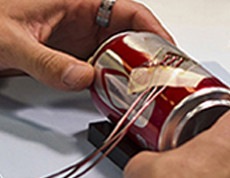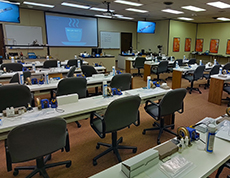Strain Gage Protective Coatings for Environmental Protection | Micro-Measurements
Protecting Your Strain Gages from Environmental Hazards
Strain gage (gauge) performance can be significantly affected by moisture, chemical exposure, and mechanical damage. To maintain accurate measurements, it’s crucial to apply the right level of environmental protection. At Micro-Measurements, we offer a range of M-Coat Protective Coatings specifically formulated to shield strain gages (gauges) and adhesives from the elements, ensuring long-lasting performance even in challenging conditions. By applying a suitable protective coating immediately after installation, you can safeguard your strain gages (gauges) from degradation and extend their service life.
The Importance of Strain Gage Protection
Strain gages (gauges) require varying degrees of protection depending on the environmental conditions they face. In controlled environments, such as an air-conditioned lab, a single layer of M-Coat A provides sufficient protection against humidity, dust, and fingerprints. However, for more severe environments, a combination of coatings or specialized procedures may be necessary to ensure robust protection.
M-Coat Protective Coatings: Engineered Solutions for Every Environment
Our M-Coat Protective Coatings are designed to meet a wide range of gage (gauge) protection requirements, from mild to extreme. The selection of coatings includes materials suitable for everything from indoor lab conditions to outdoor applications exposed to harsh weather, chemicals, or mechanical wear. The M-Coat line offers versatile solutions that can be customized to your specific needs, ensuring that your strain gage (gauge) installations are shielded against environmental stressors.

Key Benefits of M-Coat Protective Coatings:
- Versatility: A range of coatings to suit different environmental conditions, from basic indoor protection to heavy-duty outdoor resilience.
- Experimental Validation: The effectiveness of our coatings has been tested and validated in numerous applications, ensuring reliable performance.
- Enhanced Durability: Protects both the strain gage (gauge) and the adhesive layer, preserving measurement accuracy over time.
- Customizable Solutions: Combine coatings to match specific environmental challenges, providing tailored protection for your installations.
Selecting the Right Coating for Your Environment
Our M-Coat Selection Chart serves as a preliminary guide for choosing the right coating based on your application's specific needs. From protection against humidity and minor contaminants in controlled settings to robust defenses against chemicals and mechanical wear in outdoor installations, the chart helps you identify the most effective solution for your strain gages (gauges). While our coatings are designed for durability, the application technique plays a critical role in their effectiveness. We recommend conducting a test, especially for long-term installations, to verify that your selected coating system meets the desired performance criteria.
For Our Full Range of Protective Coatings
Coating Selection Guide
| ENVIRONMENT | PREFERRED | ALTERNATE | ||
| > Typical Laboratory | ||||
|
50%, or lower, relative humidity
|
M-Coat A | M-Coat C, or M-Coat D, or M-Coat F, or GageKote #1 | ||
| > Field Applications | ||||
|
Outdoor installations, shield from rain or snow
|
M-Coat F, or Barrier E | M-Coat JA or Gagekote #5 | ||
| > High Humidity, Water Splash | ||||
|
Laboratory and field applications under damp or wet conditions
|
Short Term:3140-RTV Long Term: M-Coat W-1 Wax | Short Term:3145-RTV Long Term: M-Coat F | ||
| > Water Immersion | ||||
|
Short-term, fresh water or salt water
|
Etched Teflon + M-Coat B (on vinyl insulated leadwires) + M-Coat JA | M-Coat W-1 Wax or Barrier WD | ||
|
Long-term, fresh water
|
M-Coat W-1 Wax or Barrier WD | M-Coat F or Barrier E | ||
|
Long-term, salt water
|
M-Coat W-1 Wax combined with M-Coat JA | None | ||
|
High-pressure water
|
M-Coat W-1 Wax, M-Coat JA, M-Coat FA-2, followed by M-Coat B | M-Coat F, or M-Coat W-1 Wax for short-term | ||
| > Steam | ||||
|
+212 F (+100 C), long term installation
|
Hermetically sealed metal cap, conduit for leadwires | None | ||
| > Concrete Surfaces | ||||
|
Long-term
|
M-Coat JA or Gagekote #5 | M-Bond GA-61 to seal the concrete surface | ||
| > Oils and Fuel | ||||
|
Commerical oils, to +180 F(+80 C), gasoline, and kerosene
|
M-Coat JA, or M-Coat D + two or three layers of M-Coat B | 3145-RTV + M-Coat B | ||
|
Synthetic oils, to +200 F (+95C)
|
Two or three layers of M-Bond 43B | M-Bond GA-61 | ||
| > High Temperature Air | ||||
|
To +500 F (+260 C), with good mechanical protection
|
Short Term: M-Bond GA-61 or Epoxylite #813 | 3145-RTV | ||
|
Above +500 F( +260 C) when using free filament gages
|
Gagekote #11 | None |
Ready to Protect Your Strain Gages?
Explore our range of M-Coat Protective Coatings to find the right solution for your environmental challenges. Contact us for expert guidance, or visit our selection guide to determine the best protective system for your strain gage (gauge) applications. Let Micro-Measurements help you extend the life and accuracy of your strain gages in any environment.
Contact Our Protective Coatings Experts

VIDEOS
Explore our extensive collection of tutorials and informational videos on a variety of strain measurement topics.

STRAINTALKS
Explore our free education seminars aimed at helping Design and Test Engineers understand strain gage (gauge) theory selection, preparation, performance, installation, configuration, and more.

STRAINBLOG
Questions and answers on the go! Listen to Micro-Measurements experts explain the many facets of strain gage (gauge) technology.

TRAINING
Benefit from an extensive series of regularly scheduled, hands-on technical workshops and short courses.




